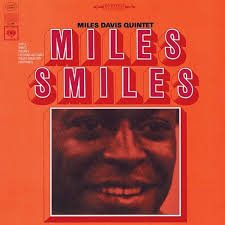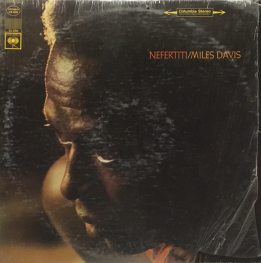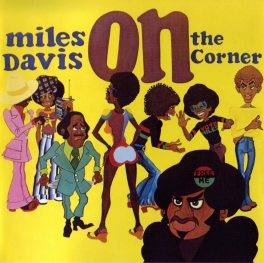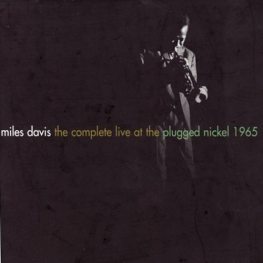 The Stork Club with Stork:
Playlist
from May 26, 2024
The Stork Club with Stork:
Playlist
from May 26, 2024

|
View Stork's profile
|
With billows and blasts from choirs and orchesters
Buskers and talkers
Big bands and squawkers,
the Stork Club has retained its qualities of decaying elegance and dwindling significance since the late 1950s.
Sunday
Noon - 3pm
(EDT)
|
On
WFMU's
Give the Drummer Radio
<-- Previous playlist | Back to The Stork Club with Stork playlists | Next playlist -->
![]() May 26, 2024: Miles Beguiles
May 26, 2024: Miles Beguiles
For Miles Davis' 98th, 3 Sunday DJs go All Miles. Jeff G did "The Children of Miles", from 9am to noon, and later from 7-9 EDT, DJ Peter will play music from the First Great Quintet, and from early days; I'll be concentrating on the years 1963 up to the early 70's, including the Second and Third Great Quintets, plus a few other delights.
Listen to this show:
 Pop-up player!
Pop-up player!
| Artist | Track | Album | Comments | Images | Approx. start time |
|---|---|---|---|---|---|
| Miles Davis |
Theme
|
The Complete Live At The Plugged Nickel 1965 | Dirty old DJ talks over... | ||
| Miles Davis |
Baby Won't You Please Come Home
|
Seven Steps To Heaven | ecorded in Hollywood on April 16 or 17, 1963 • Miles Davis – trumpet • George Coleman – tenor saxophone • Victor Feldman – piano • Ron Carter – bass • Frank Butler – drums | 0:04:46 (Pop-up) | |
| Miles Davis |
Milestones
|
Miles Davis In Europe | Miles Davis – trumpet • George Coleman – tenor saxophone • Herbie Hancock – piano • Ron Carter – bass • Tony Williams – drums • Recorded July 27, 1963 at Festival Mondial, du Jazz Antibes, France | 0:13:10 (Pop-up) | |
| Miles Davis |
Once Upon A Summertime
|
Quiet Nights | Miles Davis – trumpet • George Coleman – tenor saxophone • Victor Feldman – piano • Ron Carter – bass • Frank Butler – drums - Recorded July 27–November 6, 1962 April 17, 1963 (Quintet) at Columbia 30th Street (NYC)CBS Columbia Square (Hollywood, LA) | 0:22:28 (Pop-up) | |
| Miles Davis |
Go-Go (Theme and Announcement)
|
"Four" & More | Miles Davis – trumpet • George Coleman – tenor saxophone • Herbie Hancock – piano • Ron Carter – double bass • Tony Williams – drums • Recorded February 12, 1964 at Philharmonic Hall New York City (Bonus Track) | 0:25:54 (Pop-up) | |
| Miles Davis |
All Blues
|
My Funny Valentine Miles Davis In Concert | Bass – Ron Carter Drums – Tony Williams Piano – Herbie Hancock Producer – Teo Macero Tenor Saxophone – George Coleman Trumpet – Miles Davis - - Recorded at New York's Philharmonic Hall, part of the Lincoln Center complex, on February 12, 1964 | 0:27:32 (Pop-up) | |
| Miles Davis |
So What
|
Miles In Tokyo | Miles Davis – trumpet • Sam Rivers – tenor saxophone • Herbie Hancock – piano • Ron Carter – acoustic bass • Tony Williams – drums • Recorded • July 14, 1964 Venue Tokyo Kōsei Nenkin Kaikan, Shinjuku, Tokyo, Japan | 0:36:35 (Pop-up) | |
| DJ Would Walk A Camel For A Miles | 0:44:26 (Pop-up) | ||||
| Miles Davis |
Autumn Leaves
|
Miles In Berlin | Miles Davis – trumpet • Wayne Shorter – tenor saxophone • Herbie Hancock – piano • Ron Carter – double bass • Tony Williams – drums • Recorded September 25, 1964 at Berliner Philharmonie | 0:50:23 (Pop-up) | |
| Miles Davis |
Freedom Jazz Dance
|
Miles Smiles | Bass – Ron Carter, Drums – Tony Williams, Piano – Herbie Hancock, Producer – Teo Macero, Tenor Saxophone – Wayne Shorter, Trumpet – Miles Davis - - - Recorded at Columbia 30th Street Studio, New York City, on October 24 (tracks 1, 2, 4, 5) and October 25 (tracks 3, 6), 1966 | 1:02:58 (Pop-up) | |
| Miles Davis |
Masqualero
|
Sorcerer | Miles Davis – trumpet • Wayne Shorter – tenor saxophone • Herbie Hancock – piano • Ron Carter – double bass • Tony Williams – drums - Recorded May 16–24, 1967 at Columbia Studios, 30th Street (New York) | 1:10:10 (Pop-up) | |
| Miles Davis |
Riot
|
Nefertiti | Miles Davis – trumpet • Wayne Shorter – tenor saxophone • Herbie Hancock – piano • Ron Carter – double bass • Tony Williams – drums Recorded June 7 – July 19, 1967 at Columbia 30th Street New York City | 1:19:02 (Pop-up) | |
| Miles Davis Quintets |
Gingerbread boy
|
Stockholm 1967 & 1969 revisited | Double Bass – Ron Carter; Drums – Anthony Williams, Piano – Herbie Hancock; Tenor Saxophone – Wayne Shorter; Trumpet – Miles Davis; - - - Recorded at Konserthuset, Stockholm, Sweden on October 31, 1967 | 1:22:05 (Pop-up) | |
| Miles Davis |
Water Babies
|
Water Babies | Miles Davis – trumpet • Wayne Shorter – tenor saxophone • Herbie Hancock – piano • Ron Carter – bass • Tony Williams – drums - June 7, 13, 23, 1967 • November 11–12, 1968 • • Columbia 30th Street Studio and Columbia Studio B in New York City | 1:29:46 (Pop-up) | |
| Miles Davis |
Stuff
|
Miles in the Sky | Miles Davis – trumpet, cornet • Wayne Shorter – tenor saxophone • Herbie Hancock – electric piano • Ron Carter – electric bass • Tony Williams – drums • Recorded January 16 and May 15–17, 1968 Columbia 52nd Street (New York City) | 1:34:51 (Pop-up) | |
| Miles Davis |
Frelon Brun (Brown Hornet)
|
Filles de Kilimanjaro | Miles Davis – trumpet • Wayne Shorter – tenor saxophone • Chick Corea – piano, RMI electra-piano • Dave Holland – double bass • Tony Williams – drums • Recorded June 19–21 and September 24, 1968 at Columbia 30th Street (New York City) | 1:51:51 (Pop-up) | |
| DJ Miles Away | 1:57:30 (Pop-up) | ||||
| Miles Davis |
In a Silent Way/It's About that Time
|
In A Silent Way | Bass – Dave Holland; Drums – Tony Williams; Electric Guitar – John McLaughlin; Electric Piano – Chick Corea, Herbie Hancock; Organ – Joe Zawinul; Soprano Saxophone – Wayne Shorter; Trumpet – Miles Davis - - - Recorded at Columbia Studio B, NYC, on February 18, 1969 | 2:03:12 (Pop-up) | |
| Miles Davis Quintet |
Directions
|
Live in Europe 1969 | (The Bootleg Series, Volume 2) Introduction by André Francis; Miles Davis – trumpet • Wayne Shorter – tenor saxophone, soprano saxophone • Chick Corea – electric piano • Dave Holland – bass • Jack DeJohnette – drums July 25, 1969 at the Jazz à Juan festival, La Pinède in Juan-les-Pins | 2:23:04 (Pop-up) | |
| Miles Davis |
Medley: Gemini/Double Image
|
Live-Evil | • Miles Davis - trumpet • Wayne Shorter - soprano saxophone • Joe Zawinul, Chick Corea - electric piano • John McLaughlin - electric guitar • Dave Holland - acoustic bass • Khalil Balakrishna - electric sitar • Billy Cobham - drums • Jack DeJohnette - drums • Airto Moreira - percussion - Recorded February 6, 1970 at Columbia Studio B, NYC | 2:29:38 (Pop-up) | |
| Miles Davis |
Bitches Brew
|
Bitches Brew Live | Miles Davis - trumpet • Gary Bartz - alto saxophone, soprano saxophone • Chick Corea - Hohner electric piano • Keith Jarrett - electronic organ • Dave Holland - electric bass • Jack DeJohnette - drums • Airto Moreira - percussion, cuica •Isle of Wight Festival (1970) | 2:35:30 (Pop-up) | |
| Miles Davis |
One and One
|
On the Corner | Miles Davis – electric trumpet with wah-wah, organ • Michael Henderson – bass guitar with wah-wah • Don Alias – drums, percussion • Jack DeJohnette – drums • Al Foster – drums • Billy Hart – drums • James Mtume – percussion • Carlos Garnett – soprano saxophone, tenor saxophone • Dave Liebman – soprano saxophone, tenor saxophone • Bennie Maupin – bass clarinet • Chick Corea – Fender Rhodes, keyboards • Herbie Hancock – Fender Rhodes, keyboards • Harold Ivory Williams – keyboards • Cedric Lawson – organ • Dave Creamer – guitar • Reggie Lucas – guitar • John McLaughlin – guitar • Khalil Balakrishna – electric sitar • Collin Walcott – electric sitar • Paul Buckmaster – cello • Badal Roy – tabla - -1972 | 2:47:19 (Pop-up) | |
| Davis + Hooker |
Coming to Town
|
The Hot Spot OST | Executive-Producer – Dennis Hopper Trumpet – Miles Davis Bass – Tim Drummond ; Drums – Earl Palmer ; Guitar, vocals – John Lee Hooker; Guitar [Slide] – Roy Rogers; - released 1990 | 2:53:26 (Pop-up) | |
| Miles Davis |
The Theme II
|
The Complete Live At The Plugged Nickel 1965 - | OUTRO December 23 1965 Fourth Set THANKS ALL - DJ PETER AND THE LAUGHING CLOCK IS COMING YOUR VERY WAY - 7 TO 9PM EST - WITH MORE MILES - FROM THE BEGINNINGS - THE ROOTS! aaaand!! WENDY DEL FORMAGGIO IS FILLING IN FOR THE STORK CLUB NEXT SUNDAY . SEE YOU IN 2 WEEKS!!! | 2:56:28 (Pop-up) |






















<-- Previous playlist | Back to The Stork Club with Stork playlists | Next playlist -->
RSS feeds for The Stork Club with Stork: Playlists feed |
Playlists feed |  MP3 archives feed
MP3 archives feed
| E-mail Stork | Other WFMU Playlists | All artists played by The Stork Club with Stork |Listen on the Internet | Contact Us | Music & Programs | WFMU Home Page | Support Us | FAQ
Live Audio Streams for Give the Drummer Radio: Pop-up | 128k MP3 (More streams: [+])
Listener comments!
Revolution Rabbit Nov63:
‘ Miles Dewey Davis III (May 26, 1926 – September 28, 1991) was an American jazz trumpeter, bandleader, and composer. He is among the most influential and acclaimed figures in the history of jazz and 20th-century music. Davis adopted a variety of musical directions in a roughly five-decade career that kept him at the forefront of many major stylistic developments in jazz.[
Born into an upper-middle-class family in Alton, Illinois, and raised in East St. Louis, Davis started on the trumpet in his early teens. He left to study at Juilliard in New York City, before dropping out and making his professional debut as a member of saxophonist Charlie Parker's bebop quintet from 1944 to 1948. Shortly after, he recorded the Birth of the Cool sessions for Capitol Records, which were instrumental to the development of cool jazz. In the early 1950s, Davis recorded some of the earliest hard bop music while on Prestige Records but did so haphazardly due to a heroin addiction. After a widely acclaimed comeback performance at the Newport Jazz Festival, he signed a long-term contract with Columbia Records, and recorded the album 'Round About Midnight in 1955. It was his first work with saxophonist John Coltrane and bassist Paul Chambers, key members of the sextet he led into the early 1960s. During this period, he alternated between orchestral jazz collaborations with arranger Gil Evans, such as the Spanish music-influenced Sketches of Spain (1960), and band recordings, such as Milestones (1958) and Kind of Blue (1959). The latter recording remains one of the most popular jazz albums of all time, having sold over five million copies in the U.S.
Davis made several lineup changes while recording Someday My Prince Will Come (1961), his 1961 Blackhawk concerts, and Seven Steps to Heaven (1963), another commercial success that introduced bassist Ron Carter, pianist Herbie Hancock, and drummer Tony Williams. After adding saxophonist Wayne Shorter to his new quintet in 1964, Davis led them on a series of more abstract recordings often composed by the band members, helping pioneer the post-bop genre with albums such as E.S.P. (1965) and Miles Smiles (1967), before transitioning into his electric period. During the 1970s, he experimented with rock, funk, African rhythms, emerging electronic music technology, and an ever-changing lineup of musicians, including keyboardist Joe Zawinul, drummer Al Foster, and guitarist John McLaughlin. This period, beginning with Davis's 1969 studio album In a Silent Way and concluding with the 1975 concert recording Agharta, was the most controversial in his career, alienating and challenging many in jazz. His million-selling 1970 record Bitches Brew helped spark a resurgence in the genre's commercial popularity with jazz fusion as the decade progressed.
After a five-year retirement due to poor health, Davis resumed his career in the 1980s, employing younger musicians and pop sounds on albums such as The Man with the Horn (1981) and Tutu (1986). Critics were often unreceptive but the decade garnered Davis his highest level of commercial recognition. He performed sold-out concerts worldwide, while branching out into visual arts, film, and television work, before his death in 1991 from the combined effects of a stroke, pneumonia and respiratory failure …Gerald Early called him inarguably one of the most influential and innovative musicians of that period ‘…
Stork:
chresti:
Stork:
Yvang:
Sem:
Love the theme, the Storch.
tom tom the pipers son:
fred:
How about a round of Glen Passaic?
listener james from westwood:
Andrew in Toronto:
tom tom the pipers son:
chresti:
DJ Peter:
Stork:
Stork:
DJ Peter:
fred:
tom tom the pipers son:
coelacanth∅:
Jeff Golick:
Stork:
coelacanth∅:
tom tom the pipers son:
headcleaner:
DJ Peter:
Stork:
Stork:
Stork:
Stork:
Jeff g. via app,:
fred:
tom tom the pipers son:
Stork:
tom tom the pipers son:
Stork:
tom tom the pipers son:
doctorjazz:
Hi Stork and Clubbers!
tom tom the pipers son:
Stork:
headcleaner:
Sem:
tom tom the pipers son:
fred:
Unlike The Fall, when you got fired because the beer was served wrong
fred:
tom tom the pipers son:
BenZ WPB:
doctorjazz:
fred:
WR:
fred:
Stork:
doctorjazz:
Stork:
Stork:
doctorjazz:
tom tom the pipers son:
Stork:
tom tom the pipers son:
fred:
Stork:
doctorjazz:
David (in London):
Afternoon Stork and assembled Club hepcats.
tom tom the pipers son:
doctorjazz:
chresti:
northguineahills:
David (in London):
adamdoesit:
David (in London):
tom tom the pipers son:
fred:
adamdoesit:
Stork:
Stork:
fred:
Stork:
Stork:
David (in London):
adamdoesit:
Björk Club
2oz Glen Passaic
three slices rye bread, toasted
50g lamb testicle paté
50g fermented shark
large mushroom cap
1 sq ft organza
Moisten a slice of toast with Glen Passaic. Top with fermented shark and mushroom cap. Top with second piece of toast, and moisten that with Glen Passaic. Top that with fermented shark and organza, folded in four. Moisten third slice of toast with Glen Passaic and place atop sandwich, moistened side down. Spear randomly with toothpicks, and cut in five. Shout at it. Down remaining Glen Passaic, and serve.
Malcontent:
Now play Footprints!
Sem:
Stork:
David (in London):
Stork:
Stork:
David (in London:
Michael 98145:
Stork:
Dean:
Stork:
Dean:
Stork:
Dean:
David (in London:
Stork:
fred:
Stork:
Dean:
During its brief season, just eight to 10 weeks, Röckenwagner has the huge white asparagus flown in from Europe three times a week for his annual unsere spargelkarte or white asparagus menu. More expensive than lobster per pound, the inch-thick stalks require great care in their preparation. The peeling of white asparagus is so important that the chefs won't trust it to anyone else. It has to be done very carefully; leave a little strand of the membrane that surrounds the stem and it can give the delicate vegetable a bitter taste. The peeled stalks are then blanched in boiling water, with salt, a little bit of sugar, and lemon juice.
Malcontent:
"Footprints" was for me the big bang event where I realized Wayne Shorter's profound compositional genius... quickly confirmed once I heard "Infant Eyes."
Also... yesterday was Marshall Allen's 100th birthday! And he's still leading the Arkestra. Damn!
Stork:
Dean:
"White asparagus season traditionally ends June 20."
Stork:
Stork:
David (in London:
David (in London:
Dean:
Dean:
David (in London:
coelacanth∅:
upload.wikimedia.org...
Dean:
David (in London):
Dean:
coelacanth∅:
Dean:
David (in London):
lovelycnet.shop...
Revolution Rabbit Nov63:
adamdoesit:
Revolution Rabbit Nov63:
coelacanth∅:
Dean:
David (in London):
Malcontent:
DJ Peter:
Q: What's the most consequential use of the word "that"?
Sem:
Stork:
David (in London):
Miles called Holland one evening in London and told him to take a flight the next morning and report to the session. He did. He barely even knew where he was supposed to go! Haha.
coelacanth∅:
Malcontent:
It was the only time they performed together.
Malcontent:
Sem:
Holland was a member of Davis's rhythm section through the summer of 1970; he appears on the albums In a Silent Way and Bitches' Brew.[1] In the first year of his tenure with Davis, Holland played primarily upright bass. By the end of 1969, he played electric bass guitar (often treated with wah-wah pedal and other electronic effects) with greater frequency as Davis moved away from acoustic jazz."
David (in London):
Stork:
adamdoesit:
coelacanth∅:
David (in London):
Teo was the bomb.
Stork:
fred:
David (in London):
I like the idea of calling Paulo in about two hours' time and saying 'Session starts at 10am tomorrow in Hackney - be here.'
Chicken:
Revolution Rabbit Nov63:
Many Musics are entertaining - a select few change your nervous system like an energetic Medicine - & take you to another actual & uncharted Location...
adamdoesit:
before you get under-cooked.
Malcontent:
I saw Teo play once (alto sax) at the original Knitting Factory. Looked and spoke like your nice old uncle... including the white shoes!
Stork:
Revolution Rabbit Nov63:
Stork:
David (in London):
coelacanth∅:
Chicken:
adamdoesit:
David (in London):
mackeral:
Dean:
mackeral:
Stork:
mackeral:
coelacanth∅:
fred:
I was the noise guy, they thought they would educate me...
David (in London):
Stork:
mackeral:
David (in London):
This is such a titanic album.
tom tom the pipers son:
Michael 98145:
Dean:
Irene Trudel:
Stork:
coelacanth∅:
David (in London):
common:
David (in London):
Stork:
Dean:
Stork:
David (in London):
Dean:
https://www.youtube.com/playlist?list=PLCD255D589FC5A7E4
Stork:
David (in London):
David (in London):
mackeral:
Dean:
David (in London):
Dean:
Stork:
Michael 98145:
Dean:
tom tom the pipers son:
Revolution Rabbit Nov63:
Michael 98145:
Sem:
Thanks, the Storch. Seeya later.
Dean:
David (in London):
Jeff Golick:
coelacanth∅:
fred:
Stork:
Revolution Rabbit Nov63:
Stork:
neveract:
adamdoesit:
Revolution Rabbit Nov63:
chresti:
Thanks Stork!
fred:
Yvang:
WR:
doctorjazz: